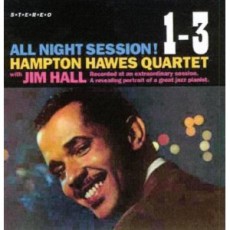
Daily Dose Of Jazz…
Hampton Hawes was born November 13, 1928 in Los Angeles, California and his first experience at the piano was as a toddler sitting on his mother’s lap while she practiced. He was reportedly able to pick out fairly complex tunes by the age of three. Entirely self-taught and influenced by Earl Hines, Bud Powell and Nat King Cole, by his teens Hawes was playing with the leading jazz musicians on the West Coast, including Dexter Gordon, Wardell Gray, Art Pepper, Shorty Rogers and Teddy Edwards. His second professional job, at 19, was playing for eight months with Howard McGhee’s Quintet at the Hi De Ho Club, in a group that included Charlie Parker, who became a great influence on his playing.
After serving in the U.S. army in Japan from 1952–1954, Hampton formed his own trio, with the bassist Red Mitchell and drummer Chuck Thompson. The subsequent three-record “Trio” sessions made by this group in 1955 for Contemporary Records were considered some of the finest records to come out of the West Coast at the time. The following year he added guitarist Jim Hall for the “All Night Sessions” that produced three records made during a non-stop recording session at the Contemporary Studios in Los Angeles.
In 1956, Hawes won the “New Star of the Year” award in Down Beat magazine, “Arrival of the Year” in Metronome magazine and the following year Hawes recorded in New York City with Charles Mingus on the album “Mingus Three”.
Struggled for many years with a heroin addiction and became the target of a federal undercover operation in Los Angeles in 1958. The DEA bargained that Hawes would inform on dealers in L.A. rather than risk a successful career. Coerced into selling a small amount of heroin to an undercover agent, he was arrested on his 30th birthday. Refusing to talk landed him a twice the mandatory minimum, ten-year sentence at Fort Worth Medical Facility, a federal prison hospital. However, after serving three years, in 1963 he was granted Executive Clemency by President Kennedy in 1963, the 42nd of only 43 such pardons given in the final year of Kennedy’s presidency.
After his release from prison, Hampton resumed playing and recording and during a world tour in 1967-68, the pianist was surprised to discover that he had become a legend among jazz listeners in Europe, Asia and the Middle East. During a ten-month period overseas he recorded nine albums, played sold out shows and concert halls in ten countries, and was covered widely in the press, appearing on European television and radio.
As a pianist Hawes’s style is instantly recognizable – for its almost unparalleled swing, unique approach to time and harmony, and its depth of emotional expression, particularly in a blues context. Hawes influenced a great number of other pianists including Andre Previn, Oscar Peterson, Horace Silver, Claude Williamson, Pete Jolly, Toshiko Akiyoshi and others.
Pianist Hampton Hawes died suddenly of a brain hemorrhage on May 22, 1977 at 48 years old. In 2004, the City Council of Los Angeles passed a resolution declaring November 13th “Hampton Hawes Day”.
More Posts: piano

